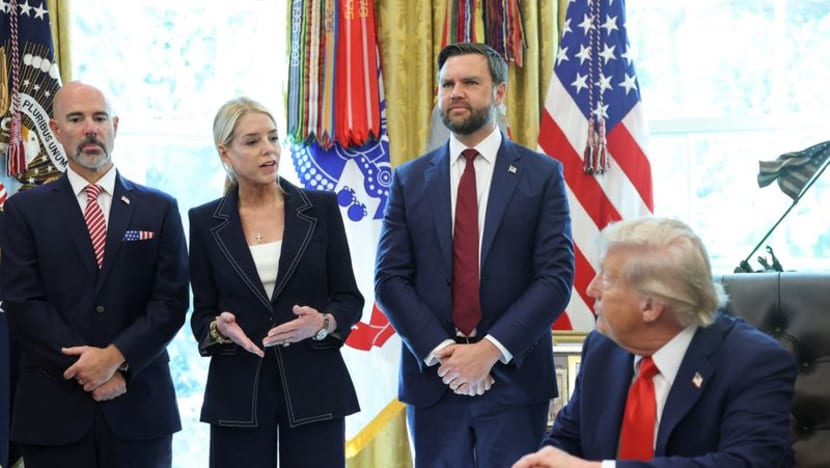Politics
Trump Administration Considers Sanctions Against EU Officials

The administration of President Donald Trump is contemplating the imposition of sanctions on officials from the European Union who are involved in implementing the bloc’s Digital Services Act (DSA). According to two sources familiar with the discussions, these potential sanctions arise from U.S. concerns that the DSA censors American voices and imposes undue costs on U.S. technology companies.
If enacted, these sanctions would represent a significant escalation in the ongoing tensions between the United States and Europe regarding technology regulations. The punitive measures would likely manifest as visa restrictions aimed at specific EU officials, although details about whom these sanctions would target remain unclear. Internal meetings within the U.S. government were reportedly held last week to discuss this issue.
The relationship between the Trump administration and the EU has already been strained due to tariff threats and ongoing negotiations, notably surrounding the treatment of U.S. technology firms. Furthermore, the administration has expressed its dissatisfaction with European efforts to regulate online content, which it views as detrimental to free speech.
Concerns Over Censorship and Freedom of Expression
The DSA aims to create a safer online environment by requiring large technology companies to take more responsibility in addressing illegal content, including hate speech and child sexual abuse material. U.S. officials, however, argue that the EU’s approach imposes “undue” restrictions on freedom of expression. In an internal cable, Reuters reported that the Trump administration has directed U.S. diplomats in Europe to advocate against the DSA, seeking to amend or repeal aspects of the law.
On August 7, 2023, Secretary of State Marco Rubio instructed diplomats to engage with EU governments and digital services authorities to express U.S. concerns about the DSA and the financial implications for American companies. Earlier in May, Rubio had suggested that visa bans could target individuals who “censor” American speech on social media platforms, indicating a broader strategy to confront perceived threats to free expression.
While a spokesperson for the State Department did not confirm the potential sanctions, they acknowledged ongoing concerns regarding censorship in Europe. “We are monitoring increasing censorship in Europe with great concern but have no further information to provide at this time,” the spokesperson stated.
An EU Commission spokesperson refrained from commenting on the possibility of U.S. sanctions but previously described allegations of censorship as “completely unfounded.” They emphasized that freedom of expression is a fundamental right within the EU and an integral component of the DSA.
Shifting Focus in U.S. Foreign Policy
Historically, the U.S. has championed democracy and human rights on the global stage. However, the current administration has shifted its focus toward achieving bilateral trade agreements, while selectively advocating for issues relevant to right-wing political agendas. The administration’s stance has led to sanctions against foreign officials, including a Brazilian Supreme Court justice, for perceived violations of freedom of expression.
Top U.S. officials, including Vice President JD Vance, have criticized European regulations, claiming they suppress conservative viewpoints. During a conference earlier this year, Vance accused European leaders of censoring the speech of right-wing parties, such as Germany’s Alternative für Deutschland (AfD), a claim that has been met with strong rebuttals from EU officials.
In March, EU antitrust and technology leaders reassured U.S. lawmakers that the DSA is intended to maintain open digital markets and is not specifically aimed at American companies. Nonetheless, U.S. social media giants, such as Meta Platforms, have expressed concerns that the DSA could lead to censorship of their platforms.
As the U.S. administration grapples with its relationship with the EU, the prospect of sanctions adds another layer of complexity to an already fraught dialogue regarding technology regulation and free speech. The outcome of these considerations remains uncertain, but the implications for U.S.-EU relations could be significant.
-

 World5 months ago
World5 months agoSouth Korea’s Foreign Minister Cho Hyun to Visit China This Week
-

 Business5 months ago
Business5 months agoStarling Bank Plans Secondary Share Sale, Targeting $5.4 Billion Valuation
-

 Top Stories5 months ago
Top Stories5 months agoMunsang College Celebrates 100 Years with Grand Ceremony
-

 World5 months ago
World5 months agoPAS Aims to Expand Parliamentary Influence in Upcoming Election
-

 Business7 months ago
Business7 months agoKenvue Dismisses CEO Thibaut Mongon as Strategic Review Advances
-

 Lifestyle6 months ago
Lifestyle6 months agoHumanism Camp Engages 250 Youths in Summer Fest 2025
-

 Sports6 months ago
Sports6 months agoDe Minaur Triumphs at Washington Open After Thrilling Comeback
-

 Sports7 months ago
Sports7 months agoTupou and Daugunu Join First Nations Squad for Lions Clash
-

 Top Stories7 months ago
Top Stories7 months agoColombian Senator Miguel Uribe Shows Signs of Recovery After Attack
-

 World7 months ago
World7 months agoASEAN Gears Up for Historic Joint Meeting of Foreign and Economic Ministers
-

 Health6 months ago
Health6 months agoNew Study Challenges Assumptions About Aging and Inflammation
-

 Business7 months ago
Business7 months agoOil Prices Surge Following New EU Sanctions on Russia









